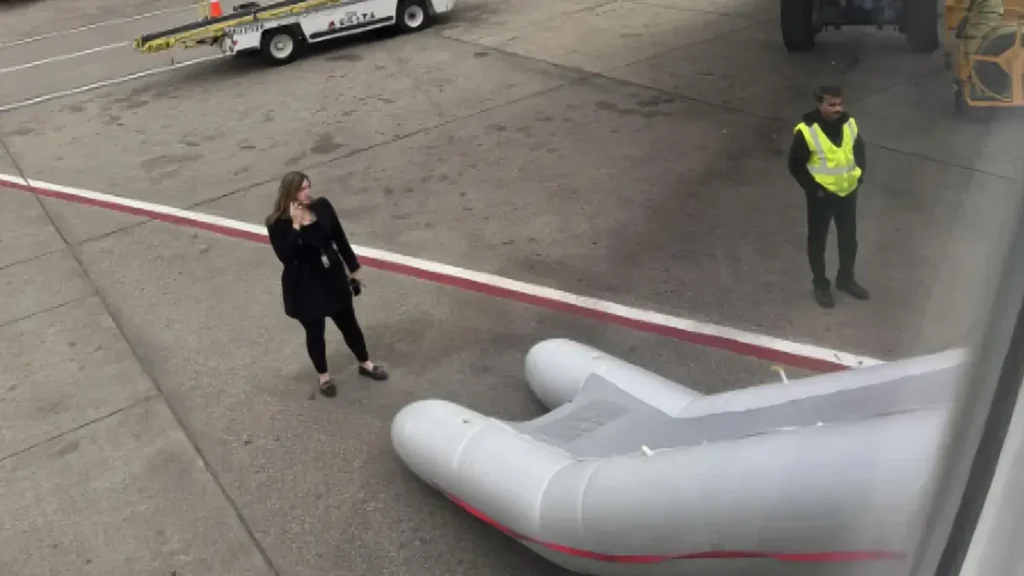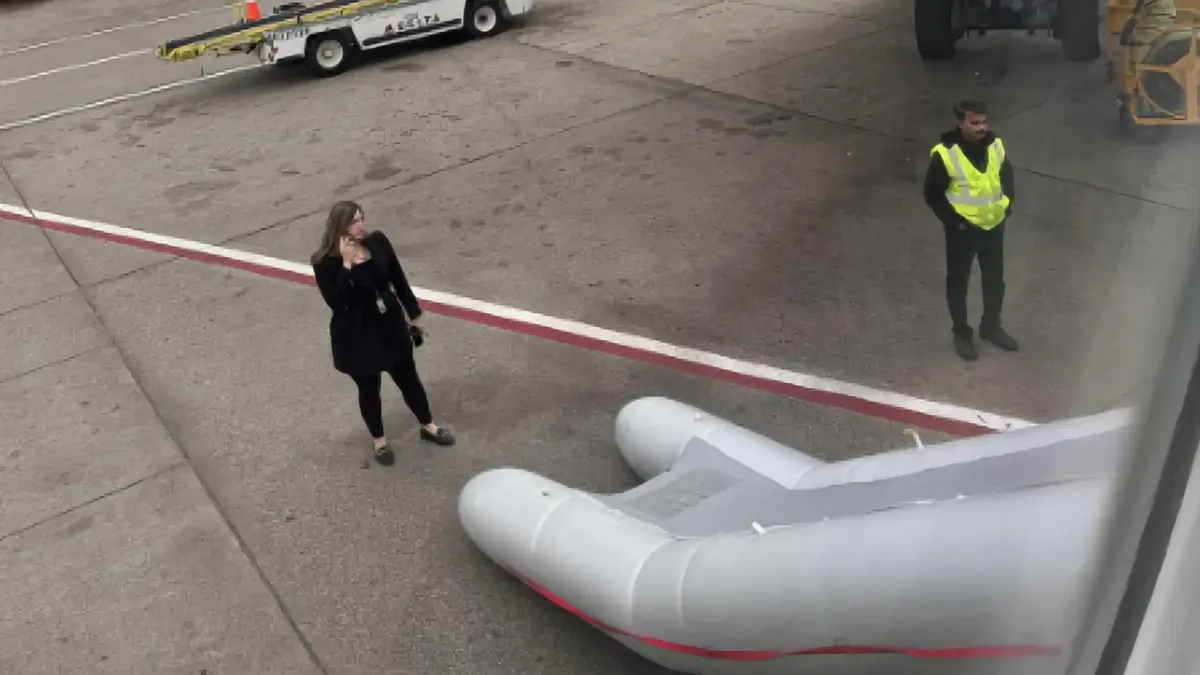A Delta flight emergency slide incident from Pittsburgh to Salt Lake City faced a major delay after a flight attendant accidentally deployed the plane’s emergency slide. Learn how this costly mistake unfolded, its financial impact, passenger experience, and what it means for airline safety.
Delta Flight Emergency Slide Incident: A Costly Mistake That Grounded Hundreds

When passengers boarded Delta Flight 3248 from Pittsburgh International Airport to Salt Lake City, they expected a routine journey. Instead, they became part of one of the most unusual aviation mishaps in recent months — the Delta flight emergency slide incident. A flight attendant accidentally deployed the emergency evacuation slide, forcing passengers to deplane and causing significant delays and financial losses for Delta Air Lines.
The incident, while rare, sheds light on the complexity of airline safety procedures, the cost of human error, and how a single mistake can ripple across an airline’s entire operation.
🛫 How the Delta Flight Emergency Slide Incident Happened
According to reports from Reddit’s aviation community and View From The Wing, the Delta flight emergency slide incident occurred just before takeoff. As passengers were settling in, a flight attendant inadvertently triggered the deployment of the aircraft’s emergency slide.
The emergency slide — a crucial part of an aircraft’s safety evacuation system — automatically inflated upon deployment. This caused immediate disruption, halting all preparations for departure.
Reversing the mistake wasn’t simple. Ground crews had to:
- Reconnect the jetbridge to the plane.
- Safely deplane all passengers.
- Spend nearly an hour detaching and repacking the inflated slide.
What was meant to be a smooth cross-country trip became a four-hour delay and an unexpected overnight stay for many passengers.
💸 The Financial Impact: Delta’s Six-Figure Mistake
While no one was injured, the Delta flight emergency slide incident was far from inexpensive. Aviation experts estimate the following cost breakdown:
| Expense Category | Estimated Cost (USD) |
|---|---|
| Slide repacking & repair | $20,000 – $25,000 |
| Passenger hotel accommodations | $30,000 – $40,000 |
| Crew repositioning & overtime | $10,000 – $15,000 |
| Flight delay & rescheduling fees | $25,000 – $35,000 |
| Total Estimated Cost | $90,000 – $115,000 |
In total, the Delta flight emergency slide incident is believed to have cost the airline over six figures once all associated expenses were tallied. Delta also had to cover hotel stays, meal vouchers, and new flight bookings for passengers who missed their connections.
🧑✈️ The Flight Attendant’s Reaction and Accountability
Witnesses say the flight attendant who caused the incident was visibly shaken and apologetic. According to reports, he told passengers it was his first such mistake in 26 years of service.
Human error remains one of the leading causes of aviation-related incidents, even in an industry known for its rigorous safety protocols. While Delta Air Lines has not publicly confirmed disciplinary measures, such incidents often lead to:
- Temporary suspension for investigation.
- Mandatory retraining in safety procedures.
- Internal reporting to aviation authorities.
⚙️ Understanding Aircraft Emergency Slides
To understand the gravity of the Delta flight emergency slide incident, it’s essential to know how these systems work.
| Component | Function |
|---|---|
| Inflation System | Uses compressed gas to deploy slide instantly in emergencies. |
| Door Sensor Mechanism | Detects door position and enables slide activation when “armed.” |
| Manual Deployment Handle | Pulled by crew in emergencies for rapid evacuation. |
| Repacking Requirement | Requires certified maintenance after any deployment. |
When an aircraft door is armed, any attempt to open it causes the slide to inflate automatically. In this case, the door may have been armed prematurely, triggering the deployment when opened by the crew.
🧳 Passenger Experience During the Incident
Passengers affected by the Delta flight emergency slide incident described the scene as confusing but calm. Many shared their experiences on social media, expressing sympathy for the flight attendant while also highlighting the inconvenience.
Key passenger takeaways included:
- A four-hour delay before the situation was resolved.
- Missed connections for travelers heading beyond Salt Lake City.
- Delta’s prompt hotel accommodations for stranded passengers.
Despite the chaos, passengers noted that Delta’s ground staff handled the situation professionally, ensuring that all passengers were safely deplaned and rebooked on later flights.
🛠️ Airline and FAA Response
Following the Delta flight emergency slide incident, Delta Air Lines released a statement acknowledging the situation and confirming that safety was never compromised. The Federal Aviation Administration (FAA) will typically conduct a routine review of such events to ensure all protocols were properly followed.
Delta reaffirmed its commitment to:
- Upholding the highest safety standards.
- Providing refresher training to crew members.
- Minimizing disruption for passengers through timely compensation.
🌐 The Broader Context: Airline Errors and Training
While the Delta flight emergency slide incident was unique, similar mistakes have occurred in the aviation industry before.
In 2019, a United Airlines attendant accidentally deployed a slide in Houston, and in 2023, an Emirates Airlines ground technician triggered one in Dubai — both costing tens of thousands of dollars.
This highlights the importance of regular crew training and strict adherence to pre-flight checklists, especially regarding door arming/disarming procedures.
📊 Comparison: Emergency Slide Incidents in Recent Years
| Airline | Year | Cause | Estimated Cost | Outcome |
|---|---|---|---|---|
| United Airlines | 2019 | Flight attendant error | $75,000 | Crew retrained |
| Emirates | 2023 | Ground maintenance error | $120,000 | No injuries |
| Delta Air Lines | 2025 | Crew door arming error | $100,000+ | Passengers delayed |
The Delta flight emergency slide incident may seem isolated, but it serves as a reminder of the human element in aviation and the potential costs of a single procedural lapse.
📚 What Happens After a Slide Deployment?
Once an emergency slide is deployed, the aircraft is considered temporarily out of service.
Steps include:
- Inspection by maintenance engineers.
- Deflation and removal of the slide system.
- Repacking by certified technicians (often off-site).
- Safety clearance before the plane re-enters service.
Each of these steps adds to the financial impact and contributes to the overall delay.
💬 Public and Media Reaction
Aviation enthusiasts and passengers on Reddit were quick to react. Many praised Delta’s swift handling of the emergency slide incident, while others expressed disbelief that such an error could occur in modern commercial aviation.
Travel blogs like View From The Wing emphasized that while costly, these incidents are rare and usually harmless to passengers — serving more as an operational lesson than a safety hazard.
❓ FAQs About the Delta Flight Emergency Slide Incident
Q1: What caused the Delta flight emergency slide incident?
A flight attendant accidentally triggered the emergency slide while the aircraft door was armed for takeoff.
Q2: Were passengers injured during the incident?
No, all passengers were safe and deplaned without injury.
Q3: How long was the flight delayed?
The flight was delayed for approximately four hours due to slide removal and maintenance inspection.
Q4: How much did the incident cost Delta Airlines?
Estimates suggest the Delta flight emergency slide incident cost between $90,000 and $115,000.
Q5: Will Delta discipline the flight attendant?
While Delta has not confirmed disciplinary action, crew retraining and internal review are standard procedures.
🧩 Conclusion
The Delta flight emergency slide incident may have been the result of a simple mistake, but it underscores the high stakes of airline operations. From the financial burden to the impact on passengers, it demonstrates how precision, training, and safety checks are essential in modern aviation.
For passengers, the event was an inconvenience; for Delta, it was a costly lesson; and for the industry, a reminder that even the smallest oversight can inflate into a six-figure problem.

